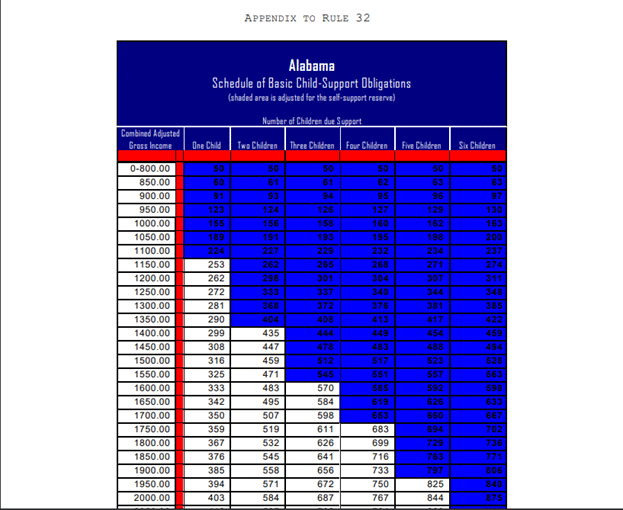
We created this guide for parents on either spectrum so that you know your rights, obligations, and the factors that determine what you receive or what you have to pay in child support. If after reading this you have further questions and would like a free consultation, you can get a free case consultation from a lawyer here. Accordingly, the first and most obvious question you have is:
How is Child Support Calculated in Alabama?
In Alabama, the law says it is the legal duty of both parents to continue supporting their children even if you are unmarried. However, just like all states, the specifics of determining financial responsibility for divorced, separated, or single parents is complicated. Why do I say that?
First, to calculate your child support obligation, the court considers:
- The gross monthly income of the custodial and non-custodial parent.
- Amount of monthly child support you pay for children from a prior marriage.
- Monthly daycare.
- Health insurance
These obligations are to be met by both parents. How do you calculate child support in Alabama? The state uses the “income shares model”, Meaning, theoretically each parent is supposed to contribute the same proportion of their income toward child support. However, the courts recognize that there are disparities in income. Consequently, more often than not, the higher-earning partner ends up paying the largest share.
The model works like this:
- To determine total combined income, your gross salary is added to your former partner’s gross. NOTE, gross income includes salaries, wages, bonuses, severance pay, pensions, interests, trust income, annuities, capital gains, social security benefits, veteran benefits, gifts, prizes, and all forms of income received. The only exclusions are public assistance benefits and child support received for children from previous relationships.
- The combined total income from both parents is divided in proportion to each depending on their gross incomes.
- Your financial obligation is calculated by multiplying the total alimony by each parent’s percentage share of the combined gross income.
In other words, the more you earn relative to your spouse’s income, the more you’ll have to pay.
Remember, these guidelines are subject to change, therefore, to stay in the loop and updated. Talk to a lawyer near you. This raises another question
What is the standard child support percentage in Alabama?
Alabama’s Schedule of Basic child support obligations, see snippet attached below, Is the easiest way to figure your obligation. simply combine your incomes and compare it to the chart below.

Question, what happens when you fail to pay child support in Alabama?
Failure to pay alimony is considered a “violation of the order”, consequently, if you miss payments for whatever reason, the custodial parent can go to the judge and get an “order of child support”. When that happens, you have about a week or two to honor your obligation failure to which may result in enforcement of the order.
What happens if a child support order is enforced?
They will take the payments by force, that means:
- Wage deductions from unemployment benefits, retirement benefits, or directly from your income.
- If the amount exceeds $1000, you may be reported to a credit bureau making it difficult to secure a loan or mortgage.
- Your passport may be suspended, revoked, or denied if the amount exceeds $5,000.
- Your car, home, or valuable property may be sold to recuperate missed payments.
- Tax refunds may be redirected or garnished if you owe more than $500.
- Your driver’s, professional, sporting, or recreational license may be revoked or suspended.
What if I’m Physically Unable to Pay Child Support?
“Contempt of court” only occurs when you willfully and purposely fail to pay alimony, and the legal remedy for that is jail time, a fine, or sometimes both. That means if you are 30 days late on payments, it might be time to lawyer up or sign an agreement with your partner.
That said, it is also true that the judge will make a decision that he or she feels is appropriate for your situation. Thus, the guidelines deviate if the child has a special need or if the parents have very high or very low incomes. So again, speak with a lawyer!
What if you can’t find the non-custodial parent?
Note that if you are beginning the process or applying for support, the CSE (Child Support Enforcement Division), requires enough information to start your case. That means you must establish paternity and provide the following:
- Non-custodial parent’s information including name, address, social security number, current or recent employer, organizations he or she might belong to, names of friends or relatives, physical description, and income information such as investments, property holdings, income, assets, pays slips, tax returns.
If you can’t provide this information, your case officer will track down the non-custodial parent via the State Parent Locator Service. He or she will check state agency records such as DMV, law enforcement agencies, correctional facilities, or state revenue departments.
On your part, what you have to present are:
- Birth certificates of children.
- a separation agreement if you have one, divorce decree or child support order.
- Records of received child support payments.
- Income and asset information.
- Healthcare, daycare, and all your child’s expenses.

What if Paternity is an Issue and Who can Apply for Assistance?
Any written statements by the individual that imply or admit that he is the father can be used as evidence. So, be very careful in your communications or get a DNA test to be sure.
On the other hand, Alabama’s law allows you to apply for assistance if:
- You have care and control but not legal custody of the child.
- Non-custodial parents.
- Custodial parents owed arrears that accrued under a court while emancipated children were minors.
- Fathers wanting to establish paternity.
- Custodial parent.
- Agency representative holding custody of a child by court order.
What if you are falsely accused?
Paternity in Alabama is established in two ways. One, it can be done voluntarily where both parents fill out a form. After which both your names will be added to the birth certificate. Two, if the parents are unable to agree on who is the father, then the matter can be taken to court to establish paternity.
That’s where DNA testing comes into play.
Note that in Alabama, children born to legally unwed parents must get a paternity action to establish the father’s identity. Thus, you are not the father until it is proven.
Remember, going to court will cost you money and time, therefore we recommend that you always try to solve paternity issues amicably before the situation escalates. The point is, if you are unsure whether or not you’re the father. Don’t sign anything, agree to anything, or make child support payments. Because all that can be used against you at a later date.
if the genetic test proves that you are not the father, you should ask the court for a paternity judgment, otherwise, you will still be considered the father and thus required to continue making payments.
What does Child Support Cover in Alabama?
In Alabama, the custodial parent is not obliged to prove how he or she spends child support money. However, child support is supposed to cover any expenses the custodial parent needs to care for the child. In general, these payments cover health care, dental expenses, entertainment, and extracurricular activities.
As your child grows in the state, your financial obligations will also change. That may mean higher expenses that may hinder your day today. To keep payments from snowballing, you can ask the court for a modification that will lower your support payments. This process is long and hard, so we recommend that you talk with a child support attorney.
Does having another child affect child support percentage in Alabama?
NO, having new children does not allow you to lower your existing child support obligations. Accordingly, the courts view adoption, stepchildren, or kids with a new spouse as “voluntary”, thus having new kids will not affect your child support percentage.
Can child support arrears be dropped in Alabama?
Child support can only be dropped if the recipient signs a release of judgment, the non-custodial parent is unemployed, self-employed, or if he doesn’t have enough assets for a creditor to seize. But remember, judgments remain valid for many years. Meaning, child support arrears can still be collected after your financial situation changes.
If you somehow manage to convince your former partner to forgive support payments, get it in writing in front of a notary public, then submit the original copy to a superior court clerk.
Additional Reading: CPS Case Laws – How long does a CPS conviction stay on your record?
What Legal Rights does a Non-Custodial Parent have in Alabama?
“Parental rights” in Alabama is a broad concept that encompasses:
- Your right to have a relationship with your child.
- The legal presumption that a child should be placed with a father or mother.
- Duties and rights of custodial parents
- Visitation rights.
The assumption is, either parent is capable of fulfilling their duties and responsibilities.
However, legally you are an unfit parent if, quote:
“you fail to properly care for your child and maintain the emotional health and overall wellbeing of the child in such a manner the failure will seriously harm the child”. This raises the question; how do you prove an unfit parent?
According to section 30-3-150 of Alabama’s family code, quote:
“minor children have frequent and continuing contact with parents who have shown the ability to act in the best interest of their children and encourage parents to share in the rights and responsibilities of rearing their children after the parents have separated or dissolved their marriage. (BUT) joint custody does not necessarily equal physical custody.”
What does this mean?
From the onset of a divorce or separation hearing, both parents are considered fit to care for the child. However, if one party can prove drug or alcohol abuse, child abuse, neglect, or a dangerous situation or environment for the child, then that parent is considered unfit under state law.
What if both parents are found unfit?
A third party such as grandparents or a state agency can petition the court if they feel that both parents are unfit. But remember, you must have evidence of the aforementioned identifiers of an unfit parent. Conversely, if your goal is to prove parental fitness, then you must demonstrate to the court that the child will benefit physically and emotionally if he or she is returned to you.
At what age does child support end in the state of Alabama?
19 years is the age of emancipation in Alabama; nevertheless, each case is unique, meaning there is no one solution for alimony cases, and these payments don’t always end at 19. Fortunately, some conditions allow termination early while others may require you to continue payments after 19.
So again, have a conversation with a lawyer!
Conclusion
Alabama’s child support guidelines are not very straight forward and some regulations change, so, whether you are going through a divorce or separation, always try or rather end matters amicably. Because, if you can’t reach an agreement, the courts will make one for you and it might not be in your favor.
Since we don’t know the specifics of your case, contact us or talk to a lawyer near you for better insight into the legal inner workings of child protection.
More Alabama Laws
- Alabama Car Seat Laws
- Alabama Child Support Laws
- Alabama Hit and Run Laws
- Alabama Lemon Law – What are the Laws on Defective Vehicles in Alabama?
- Alabama Recording Laws
- Alabama Sexting Laws
- Alabama Statute of Limitations
- Alabama Whistleblower Laws
- Dog Bite Laws Alabama
- Murder Sentencing Guidelines – Minimum to Maximum for Every State